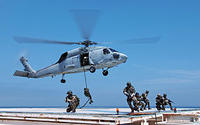-
DOD policy drives militarization of local police departments
The adoption of military gear by local police departments across America – some call it the “militarization” of American police – has been going on for a while. Now, observers ask whether this trend might have repercussion which should make citizens uneasy. Police department receive the equipment for free – all they have to do is pay for the shipping. The gear being sent to local police includes planes, helicopters, armored vehicles, grenade launchers, assault rifles, bullet-proof helmets, night-vision goggles, and more. A few sheriff departments ordered tanks.
-
-
Furloughs hamper U.S. ability to respond to chemical disasters
Rafael Moure-Eraso, the chairman of the U.S. Chemical Safety Board(CSB) warned that the agency would be unable to respond to major chemical-related disasters if the government shutdown continued. The agency has furloughed more than 90 percent of its workers. The shutdown has delayed other CSB investigations into chemical accidents in California, Utah, Washington, and Texas. Moure-Eraso said that the delays in investigations could threaten public safety as the agency is unable to make recommendations for prevention of similar accidents.
-
-
Discovery points way to treatment of lethal toxin botulism

Botulinum neurotoxins are produced by Clostridium botulinum and cause the possibly fatal disease botulism, which impedes nerve cells’ ability to communicate with muscles and can lead to paralysis and respiratory failure. The botulinum toxin has also been identified as a potential biological weapon against a civilian population. Scientists have decoded a key molecular gateway for the toxin that causes botulism, pointing the way to treatments that can keep the food-borne poison out of the bloodstream.
-
-
ACS: Shutdown undermines U.S. innovation, competitiveness, critical services
American Chemical Society (ACS) president Marinda Li Wu said that the budget impasse is effectively choking America’s science innovation pipeline, strangling new discoveries, future economic growth, and job creation. “[T]o shut down a critical part of our nation’s research and innovation pipeline puts our nation at a severe competitive disadvantage globally,” said Wu. “A government shutdown that closes the world’s largest research system can lead to unintended negative consequences putting at peril America’s economic growth and long-term stability.”
-
-
Calif. Gov. Brown vetoes restrictive assault weapon measures
Governor Jerry Brown of California, saying that “The state of California already has some of the strictest gun laws in the country,” on Friday vetoed two measures which would have restricted the sale and possession of some semi-automatic assault weapons, and two other measures which would have tightened firearms reporting requirements and denied guns to DUI offenders. The governor’s vetoes derailed the most sweeping gun legislation measures to be considered so far this year by the California legislature. Brown signed several smaller pieces of gun legislation into law on Friday.
-
-
Shutdown paralyzes U.S. food safety regime
Food safety experts this week said that the government shutdown is putting Americans at risk, as the shutdown caused all inspections of domestic food, except meat and poultry, to be halted. The shutdown comes on top of earlier budget cuts to food safety-related agencies, cuts which have already made the food safety inspection regime weaker, so that the shutdown, in the words of one knowledgeable observer, is “creating the potential for a real public health crisis.”
-
-
More government troops than rebels killed so far in Syria
The most recent fatality report from the reliable, U.K.-based Syrian Observatory for Human Rights says that between the start of the war in March 2011 and 31 August 2013, 110,371 people had died in Syria. The breakdown of those killed: 40,146 civilians (including 4,000 women and more than 5,800 children); more than 45,000 government troops (made up of 27,654 army soldiers, 17,824 pro-regime militia, and 171 members of Hezbollah); 21,850 rebel fighters; and 2,726 unidentified people.
-
-
Web sites secretly track users without relying on cookies
Device fingerprinting, also known as browser fingerprinting, is the practice of collecting properties of PCs, smartphones, and tablets to identify and track users. For the vast majority of browsers, the combination of these properties is unique, and thus functions as a “fingerprint” that can be used to track users without relying on cookies. Researchers have discovered that 145 of the Internet’s 10,000 top Web sites use device fingerprinting to track users without their knowledge or consent.
-
-
German neo-Nazis targeted Chancellor Gerhard Schröder for assassination

Beate Zschäpe, the last surviving members of the National Socialist Underground, a violent German neo-Nazi group, is on trial this month for taking part in the murders of eight Turkish immigrants, one Greek man, and a German policewoman, in addition to participating in fifteen bank robberies and two bomb attacks. In testimony Monday, a police investigator said that computer files found in an apartment used by NSU member indicate that in 2002, the group was working on a plot to assassinate the then-chancellor Gerhard Schröder.
-
-
Libya sliding toward anarchy: PM abducted, then released
In the most ominous sign yet that Libya is sliding toward anarchy two years after the rebellion that ended Col. Muammar al-Qaddafi’s four decades of dictatorship, members of a Libyan militia which is supportive of the government earlier today abducted the Libyan prime minister, Ali Zeidan, then released him after several hours. The anger in Libya over the U.S. Saturday operation to seize al Qaeda leader Abu Anas al-Libi, has intensified an already simmering anger toward the corrupt and ineffectual Zeidan government. On Monday, soldiers who were complaining that they had not been paid occupied Zeidan’s Tripoli office. Libyan oil production has been at a standstill since July, with striking troops in the east and tribal militias blockading ports and oilfields claiming oil revenues are being stolen by militias close to Zeidan or misspent. Libya does not have credible army, police, or security forces, and the government relies on freewheeling militias, formed during and after the anti-Qaddafi rebellion, to provide security.
-
-
Virginia police built massive data base of political rallies participants
From 2010 until last spring, the Virginia State Police (VSP) used automatic license plate readers (ALPRs) to collect information about – and build a massive data base of — political activities of law-abiding people. The VSP, for example, recorded the license plates of vehicles attending President Obama’s 2009 inauguration, as well as campaign rallies for Obama and vice presidential candidate Sarah Palin. Following a strong opinion by Virginia Attorney General Ken Cuccinelli, the VSP discontinued the practice, and the agency says it has purged its license plate database, and now disposes of ALPR-obtained information within twenty-four hours of collection, unless it is relevant to a clearly defined criminal investigation.
-
-
U.S. keeping too much data on too many people for too long: report
A new study surveys five methods of data collection by U.S. intelligence and law enforcement agencies, and finds that these agencies not only collect massive amounts of innocent Americans’ data, but can share and store this data for up to seventy-five years or more, creating opportunities for abuse and clogging government databases.
-
-
NSA tried to crack Tor anonymity tool
In its efforts to gather more intelligence, and overcome obstacles to this effort, the National Security Agency (NSA) has repeatedly tried to develop attacks against people using Tor, a software tool designed to protect online anonymity – and which is primarily funded and promoted by the U.S. government itself to help political activists, whistleblowers, militaries, and law enforcement. The NSA’s determined effort to crack Tor raises questions about whether the agency, deliberately or inadvertently, acted against Internet users in the United States when attacking Tor. One of the main functions of Tor is to hide the country of all of its users, meaning any attack could be hitting members of Tor’s large U.S. user base.
-
-
Greater role for Pentagon in next phase of U.S. war on terror

The Obama administration had dramatically increased the use of drones in the war against terrorists. The number of drone strike has declined this year relative to the high levels of 2010-11. The number of drone strikes may increase again, but this past weekend’s Special Forces raids in Somalia and Libya are an indication that the next phase in the U.S. war on terrorism would see, in relative terms, less of a reliance on CIA-operated drones and a greater role for the Pentagon.
-
-
A guide to terrorist, security actors in East Africa
The continuing violence in East Africa is often attributed to Somalia’s instability, triggered by the collapse of the government more than twenty years ago, and the descent of the country into a war among war lords, tribes, and religious factions. Here is a useful guide to the main groups and organizations which operate in the region which extends from Eritrea in the north to Tanzania in the south.
-
More headlines
The long view
Factories First: Winning the Drone War Before It Starts
Wars are won by factories before they are won on the battlefield,Martin C. Feldmann writes, noting that the United States lacks the manufacturing depth for the coming drone age. Rectifying this situation “will take far more than procurement tweaks,” Feldmann writes. “It demands a national-level, wartime-scale industrial mobilization.”
No Nation Is an Island: The Dangers of Modern U.S. Isolationism
The resurgence of isolationist sentiment in American politics is understandable but misguided. While the desire to refocus on domestic renewal is justified, retreating from the world will not bring the security, prosperity, or sovereignty that its proponents promise. On the contrary, it invites instability, diminishes U.S. influence, and erodes the democratic order the U.S. helped forge.
Fragmented by Design: USAID’s Dismantling and the Future of American Foreign Aid
The Trump administration launched an aggressive restructuring of U.S. foreign aid, effectively dismantling the United States Agency for International Development (USAID). The humanitarian and geopolitical fallout of the demise of USAID includes shuttered clinics, destroyed food aid, and China’s growing influence in the global south. This new era of American soft power will determine how, and whether, the U.S. continues to lead in global development.
Water Wars: A Historic Agreement Between Mexico and US Is Ramping Up Border Tension
As climate change drives rising temperatures and changes in rainfall, Mexico and the US are in the middle of a conflict over water, putting an additional strain on their relationship. Partly due to constant droughts, Mexico has struggled to maintain its water deliveries for much of the last 25 years, deliveries to which it is obligated by a 1944 water-sharing agreement between the two countries.
How Disastrous Was the Trump-Putin Meeting?
In Alaska, Trump got played by Putin. Therefore, Steven Pifer writes, the European leaders and Zelensky have to “diplomatically offer suggestions to walk Trump back from a position that he does not appear to understand would be bad for Ukraine, bad for Europe, and bad for American interests. And they have to do so without setting off an explosion that could disrupt U.S.-Ukrainian and U.S.-European relations—all to the delight of Putin and the Kremlin.”
How Male Grievance Fuels Radicalization and Extremist Violence
Social extremism is evolving in reach and form. While traditional racial supremacy ideologies remain, contemporary movements are now often fueled by something more personal and emotionally resonant: male grievance.
